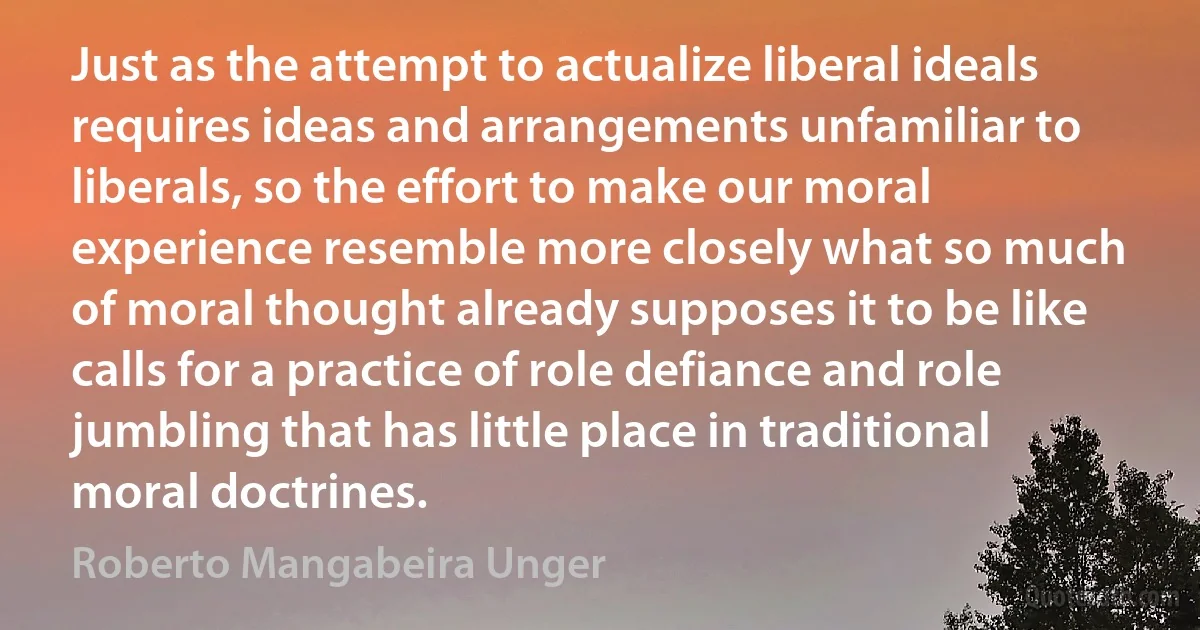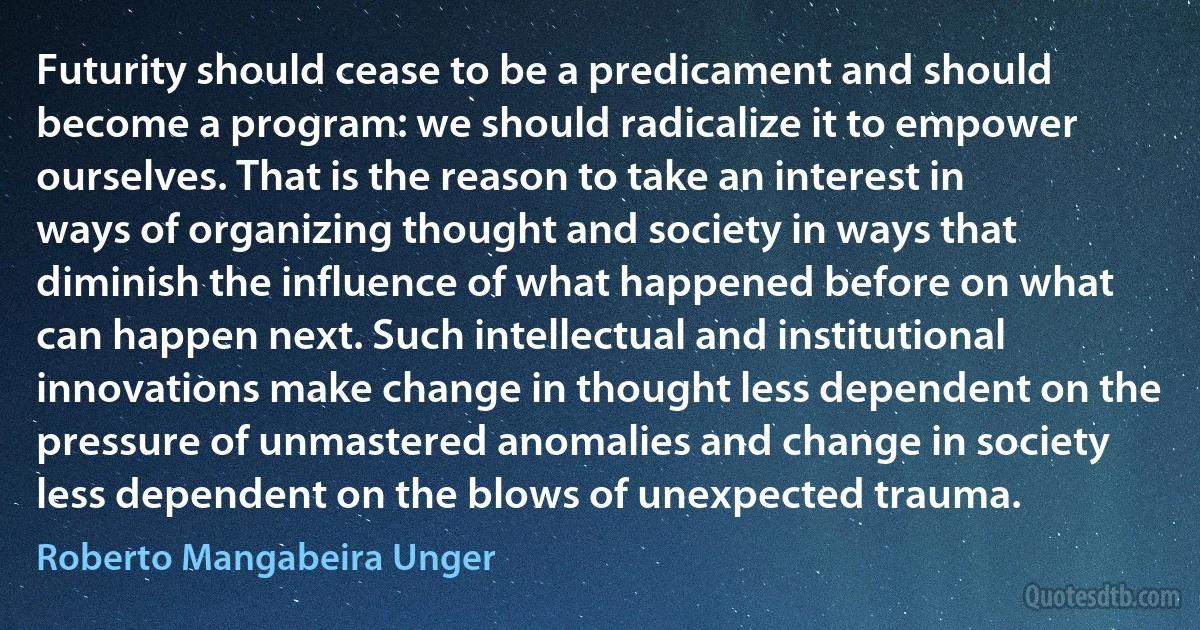Roberto Mangabeira Unger quotes
There is no aspect of a people's collective life that may not have to be abandoned for the sake of meeting a practical challenge, just as there is no aspect they may not have to jettison in order to deal with the visionary appeal in politics. Consequently, the different forms of social life that exist in the world are always less real than they seem; the differences among them subsist on a containment of conflict. If the nations of the world were exposed to constant practical and visionary conflict, none of the differences among them would have any permanence. This does not mean that the peoples would become alike; it does mean that the marks that distinguish their identities would constantly shift hands and that other marks, never before dreamt of, would suddenly appear.

Roberto Mangabeira Unger
The utopian element in politics lies in the ability to disentangle the image of possible human association from forms of life that make people's material and moral ability depend on their acceptance of predetermined hierarchical and communal divisions. The struggle of this visionary politics is to deny the identification of society with a limited repertory of social forms. Such a repertory imprisons all experiments in practical collaboration, in self-expression and reconciliation, within a determinate scheme of ranks and divisions, of authoritative ideals, and of accepted contexts for the realization of these ideals.

Roberto Mangabeira Unger
For the struggle with the world, ordinary men and women have the spark of the divine. They are embodied spirit, unresigned to belittling circumstance. They can ascend, whether or not with the help of divine grace .... It is not just that the lowly are equal to the lordly and that the vulgar forms of sensibility are as revealing as the hieratic or canonical ones. It is that the lowly and the vulgar are higher. They are higher because they are freer from the posturing and vigilance-over himself and others-that prevent each of us from coming closer to what Shakespeare called the thing itself: unaccommodated man. The more orphaned ordinary men and women are by the established powers of the world, the more reason they have to find the divine within themselves and to struggle against the constraints that established arrangements impose on their rise to a larger life and a higher state of being.

Roberto Mangabeira Unger
The characteristic method of social invention in general and of the development of negative capability in particular is to seize on deviant, subsidiary, or repressed elements in present or remembered experience and to push them toward a dominant position, all the while changing them in the course of this extension.... [T]he most successful transmutations over the long run-the ones least vulnerable to subversion by practical rivalry, moral indignation or aspiration, and by theoretical insight-are likely to be those that permit or invite further tinkering. Thus, they may be repeatedly corrected rather than entirely replaced.

Roberto Mangabeira Unger
For all the classic social theorists, the effort to state a comprehensive view of men and society was inseparable from an interest in understanding the condition and prospects of their age. In this they simply repeated the eternal lesson that all deep thought begins and ends in the attempt to grasp whatever touches one most immediately.

Roberto Mangabeira Unger
If I propose something distant, you may sayː interesting, but utopian. If I propose something close, you may answerː feasible but trivial. In contemporary efforts to think and talk programmatically, all proposals are made to seem either utopian or trivial. We have lost confidence in our ability to imagine structural change in society, and fall back upon a surrogate standardː a proposal is realistic if it approaches what already exists. It is easy to be a realist if you accept everything.

Roberto Mangabeira Unger
The disproportion between our capabilities and our shared situations would be merely ironic or tragic if we were unable to diminish it. By doing so, we change, to our benefit, the quality of our relation to our cognitive and social assumptions. As a result, we also alter, to our advantage, the quality of our relations to one another. We put more of the infinite us into the finite worlds in which we live.

Roberto Mangabeira Unger
The more successfully we learn and practice the gospel of plasticity, the less suitable we become as subjects of the necessitarian styles of social and historical analysis that the great social theorists have taught us. We can, in fact, raise a storm in the world and still understand and explain ourselves. All we need is a better approach.

Roberto Mangabeira Unger
One way to clarify the origin and character, if not the justification, of the ideal inspiring our programmatic institutional ideas is to say that our program arises from the generalization of aims broadly shared by the great secular doctrines of emancipation of the recent past-both liberal and socialist-and by the social theories that supported them. At the heart of each of these doctrines lay the belief that the weakening of social divisions and hierarchies would reveal deeper commonalities and liberate productive and creative powers. The theoretical and practical consequences of this belief were drastically constricted by dogmatic assumptions about the possible forms of social change and their possible institutional expressions. We have attacked the second set of constraints and therefore, by implication, the first. The result is a more generalized or radicalized version of the social ideal. Our attack on these constraints has led us to rethink the content of the progressive cause.

Roberto Mangabeira Unger
To explore the countercurrents of consciousness in a given circumstance-uncertain promises of other futures; to trace the struggle between spirit and structure in every domain of social and cultural life; to show how vision becomes embodied in institutions and practices and, in being embodied, is both undermined and corrected, but in any event transformed; to reveal how we forfeit our freedom to imagine and reconstruct, and then regain it, even against our will; to commandeer alien wisdom the better to criticize the established order and present experience; to give voice to what has lost a voice or not yet gained one; to display in every department of our experience, from the micro to the macro and from passion to calculation, the revolt of the infinite within us against the finite around us-all this is the work of the humanities when they recognize us for what we are and might become.

Roberto Mangabeira Unger
I ask myself in this bookː on what assumptions about the world and the mind, the self and society, do these beliefs-mere translations and developments of a creed that has already taken over the world and set it on fire-continue to make sense? Within what larger combination of ideas can we ground, develop, and correct them?

Roberto Mangabeira Unger
The argument of the social theory developed in this book [works] out the idea that each imaginative and institutional form of society represents an attempt to freeze, into a particular mold, the more fluid experiences of practical and passionate relationship characterizing the immediate, relatively unreflective, uninterpreted, and undisciplined life of personality. The dogmas and arrangements inform this life and alter it. But they do not completely overcome its recalcitrance or determine its inner nature. The visionary impulse in politics draws much of its persuasive force from the appeal to this defiant experience.

Roberto Mangabeira Unger
We cannot wait until we agree upon the truths of a new social theory to think and act as democratic experimentalists. We must find the ideas our efforts and commitments require, and try to make no assumptions that the facts of social reality and historical experience invalidate.

Roberto Mangabeira Unger
The ultimate stakes in politics are the qualities of the direct relations among people.... This fine texture of routinized human relations is the primary social reality. Even the boldest transformative efforts often take it for granted or, having acknowledged its importance, fail to alter it.

Roberto Mangabeira Unger
[T]wo moments, of trance and struggle, mingle in the real life of societyː an undercurrent of conflict and disbelief always counteracts the routines of dependence and deference. Society, no matter how impregnable it seems to its inhabitants, always stands at the edge of the cliff. The petty practical quarrels and normative disputes, endlessly refought to reproduce a social world in the face of divergent interests and changing circumstance, can escalate at any moment into broader and more intense conflicts that put this world at risk.

Roberto Mangabeira Unger
The relation of politics to personality in this deepening of democracy has a scope broader than the need to economize on political virtue. One way to explore this relation is to consider the bearing of a program like the one outlined here upon two great sources of human sadnessː the loss of vitality and the disproportion between such vitality as we keep and the activities normally available for its expression.

Roberto Mangabeira Unger
![[T]he vision and anticipatory experience of transformed personal relations encourage the self-restraint vital to successful institutional reconstruction. When the government's active engagement in the defense of established institutional arrangements has been shaken by violent or peaceful means and when settled assumptions about collective identities, interests, and opportunities have come partly unstuck, institutional reinvention enjoys its favored moment. This opportunity can, nevertheless, be squandered if redistribution over material advantages takes priority over institutional reconstruction. (Roberto Mangabeira Unger)](https://cdn.quotesdtb.com/img/quotes_images_webp/88/roberto-mangabeira-unger-active-852388.webp)


